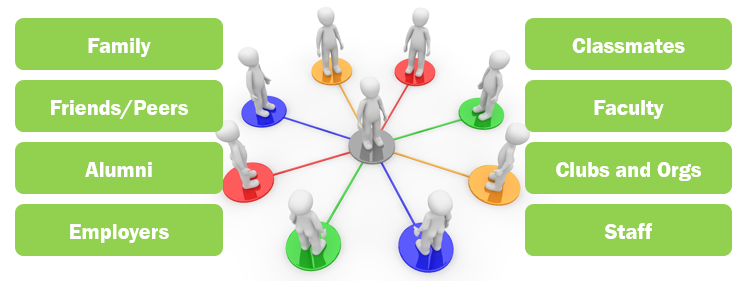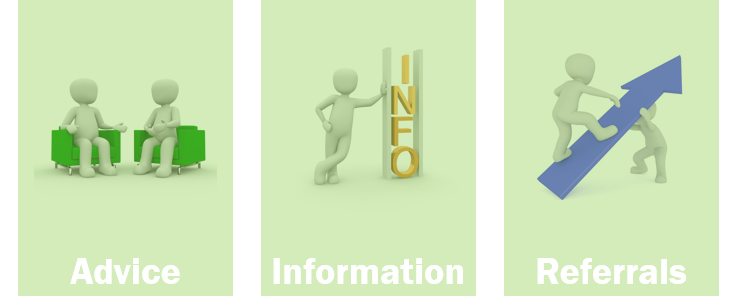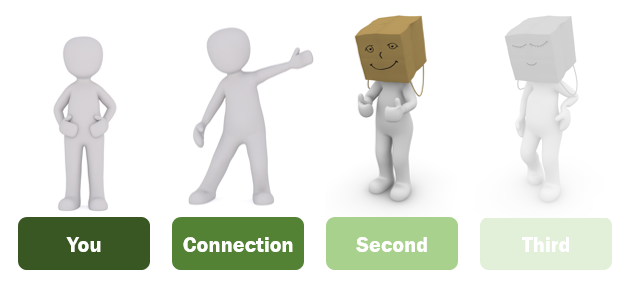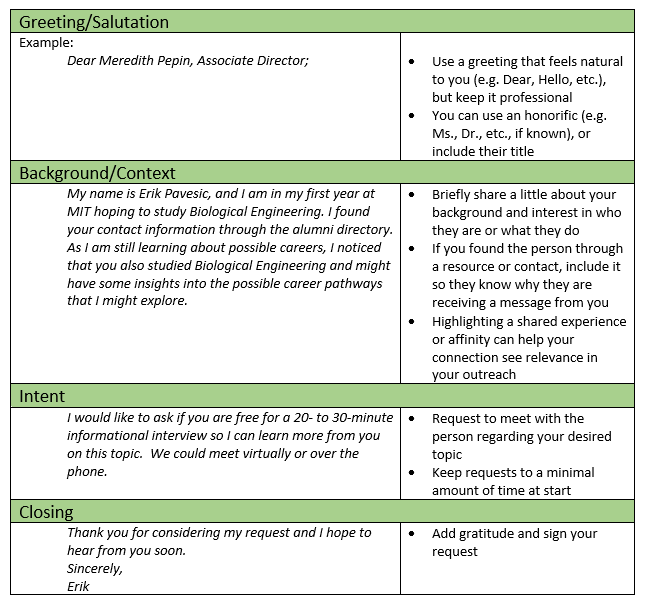You may feel a little overwhelmed with the idea of professional networking. Media portrayals might make you visualize the classic idea of a stuffy business networking event where people in suits awkwardly shake hands while balancing small plates and glasses of wine. As a result, you may be wondering how to network in this new normal, and what might you yield as a result of it.
Networking has a lot of similarities to gardening. You probably realize that you can’t throw a seed at the ground, shout “Grow!” and expect a fruit-bearing tree to immediately appear (although, who knows, maybe someone at MIT is working on that). Networking, like gardening, takes time, effort, and persistence—so be patient. Over time, a well-tended network can yield some positive results.
Identifying your network
Believe it or not, you already have a network. Your friends and family, and basically everyone you have come in contact with since the day you were born could be in your network. You might not have realized it, but this network has supported you up until this point, and in many cases may be open to helping you long into the future as well. As you start to think about your career, you can start to look to this existing network for support on your career.

Likewise, this initial network can serve as an intermediary between you and other people you might want to connect with. Even with CAPD, you are adding people to your network that can help you and introduce you to more people. This is the foundation of your professional network.
Leveraging your Network
Why have a network? Your network can provide you with a lot of support with your career, both now and in the future.
Ways your network can help you
Here are some reasons that you as a first-year student might want to leverage your network:
Career exploration
If you are uncertain about what major to choose, what internships are out there, or what you might want to do when you graduate—your network might be a good place to start. By asking juniors and seniors what they majored in may help you explore different majors. Talking with a sophomore may reveal opportunities that they did over their last summer. Chatting with graduate students and alumni may provide insight into future options after graduation.
Just because they chose to do what they did does not mean it’s 100% in line with what you want to do, but it might just help you eliminate some options or cast a new glow on others.
Career planning
How did that senior manage to juggle their classes, clubs, and an internship? Why don’t you ask them? In some ways, the students (and alumni) above you have taken similar classes to you, and might have had their own doubts and aspirations as a first-year student themselves. Talking with your network may give you a pathway forward. They might help you identify a new resource that helped them through a challenging experience. Juniors and seniors might be willing to share their past Courseroads to help you plan yours. Graduate students and alumni might help you think about what steps you need to take for certain careers and graduate programs.
Getting insight into their own pathways might also help you think about what matters to you, and what you might want to do going forward. You don’t have to perfectly follow what they did, instead use it as an opportunity to plan and avoid potential pitfalls.
Career Research
In some ways, your network offers glimpses into possible future versions of you. Chatting with a student who recently completed their internship might give you an idea if that sounds like something you may be interested in. Asking an alum about the culture of their organization may just help you determine if that type of work aligns with your own values. Think of it as asking for a recommendation for a restaurant or a show to stream. Their personal tastes and preferences will not be necessarily those of yours, but you might be able to identify if you can potentially see yourself in their shoes.
Beyond
After your first year, your network stays and grows with you provided that you are properly maintaining it. You might rely on your network for help with:
- Finding jobs or serving as a referral
- Navigating advancement opportunities or changing careers
- Seeking out professional development opportunities, trainings, or professional certifications
- Managing your version of work/life balance
Conduct Informational Interviews
Probably the easiest way to leverage your network is through conducting an informational interview. An informational interview is an opportunity for you to ask questions of a person to gain insight and information. Informational interviews tend to be short (20-30 minutes) but they can be just the right amount of contact you need to start a meaningful connection.
A way to think about an informational interview is simply by asking for AIR. This is a way to remind yourself of some of the most important insights you might get from your network: Advice, Information, and Referrals.

Advice
Advice is about finding information that is personally helpful to you. It’s a way to get your network to help you strategize what are possible things you should do (or not do).
- How should I reach out to faculty to inquire about a UROP position?
- What do you wish you had known before you chose this major?
- How did you find out about this opportunity?
Information
Where advice is about you, information can provide additional insights that you might be able to leverage in exploration, planning, and decision making.
- What is a typical workday like for an intern in your company?
- What is the application deadline for this research opportunity?
- What percentage of interns receive return offers?
Referrals
Finally, referrals allow you to navigate further beyond this conversation. Think of referrals as a way to seek out new resources and connections to help you move in new directions.
- What other companies should I explore that do this type of work?
- Is there someone you know that I might also benefit from talking to?
- What resources should I consider using to learn more about this?
Here are more informational interview questions you might want to ask.
Informational interviews provide you, the interviewer, with many helpful details. When conducting an informational interview, be sure to take notes and take time afterwards to reflect on the information you have learned. At the conclusion, remember to say thank you and follow-up with a thank you email to the person you interviewed with.
Growing your Network
So, how do you grow your network? You already have your initial network, but how do you add to it? Being at MIT provides you some helpful additions to your network, including:
- Classmates
- Roommates
- Faculty and staff
- Student clubs and organizations
- Departments, Labs, and Centers (like CAPD)
And you may also discover a rich group of connections beyond campus as well, including:
- Alumni
- Employers
Find connections
Your roommates, classmates, and advisors may be easy to tap into as you come in contact with them daily, but you might need help expanding your connections beyond this convenient assortment of people. Ask your existing network for recommendations, but know that there are additional ways to find connections at MIT:

Division of Student Life
DSL is a great resource to tap into to find out about the variety of campus activities that you can get involved with, including the Hobby Shop; Campus Activities Complex; Student Organizations, Leadership, and Engagement (SOLE); Leadership Programs; and the Association of Student Activities (ASA). Your next connection may come from Chess Club, dance team, LeaderShape, or an event on Engage.
MIT Alumni
Alumni make wonderful connections for your network—having graduated from MIT means they can empathize with what you are going through, but can provide an outside perspective as you are considering how your major might connect with life after graduation. You can find alumni in the Directory, Advisors Hub, and LinkedIn. Here is additional guidance on ways you can use LinkedIn.
Employers, Career Fairs and Events
Being at a school like MIT means that people sometimes come here to connect with you. Employers from around the world come to MIT to connect with students and recruit for internships and full-time positions. You can learn more about employers on Handshake and see events that they are hosting. You might also want to schedule in time for one of the many career fairs that happens on campus around the year.
Family and Friends
You may feel that your family and friends are not in fields you are interested in exploring, but what about the people they know? Sharing information with your existing network—like possible career paths you are considering, may help you expand your network as they might know someone in that field. Your connections have connections too, and it is not until you ask that you might learn more about who you can access.
Making connections
Whether you initiate contact using email, messaging, or phone calls, it’s always recommended that you think about what you want to say before conducting outreach. Here are a couple of quick tips to help you make the most of your connection efforts:
Prepare
Before you even start to draft a message, research and preparation can help you make the most of your outreach. So first, get organized. You might want to start with a simple list of potential connections you would like to make—it doesn’t have to be specific people, but rather topic areas or careers. For example: “person who works in biotech” or “person who does product management”.
Research can take many forms, but an easy way is to simply conduct a web search for the topic or people you are looking to connect with. Sometimes in your search, you might find a shared connection you have with that person who can help introduce you. You might also get several of your questions answered by reviewing online information and some people have their online profiles on LinkedIn or Advisors Hub. You might also find shared affinities that can help create a better connection with your selected contact.
Request
Now that you have some information from your research you can start to conduct outreach to your selected connections. Most likely you will reach out to them via email, but this template can be adapted for social media messaging or even phone calls.

Dear Meredith Pepin, Associate Director;
My name is Erik Pavesic, and I am in my first year at MIT hoping to study Biological Engineering. I found your contact information through the alumni directory. As I am still learning about possible careers, I noticed that you also studied Biological Engineering and might have some insights into the possible career pathways that I might explore.
I would like to ask if you are free for a 20- to 30-minute informational interview so I can learn more from you on this topic. We could meet virtually or over the phone.
Thank you for considering my request and I hope to hear from you soon.
Sincerely,
Erik
As you continue outreach, revise and refine your approach. Avoid a template outreach request as it may appear inauthentic to the recipient. Take a few moments between messages to go through the steps above to make certain your request will catch the attention of your prospective connection.
Interact
It is highly probable that not all of your outreach attempts will yield success. Remember that effective networking takes time, effort, and persistence. For the ones who do, be prepared to be respectful of their time, and it never hurts to show gratitude. In being respectful of their time, you may want to limit your requests to simple asks like an informational interview or seeking guidance on your resume. Over time, you may be able to advance your connections into more mutually beneficial relationships, but at the start simply be grateful for any time they can provide.
For the outreach attempts that don’t yield a response, that’s okay. Some people might not regularly check the email that you found for them, or some might not have time at the moment. Likewise, a “no” may simply mean a “not now” and so do not feel that you need to cross them off of your list right away. Instead, plan when you might want to follow up, and be respectful for any support they can offer you at this time.
Maintaining your Network
Now that you are in your first year at MIT, you might realize that your connections from before coming to MIT are changing. People you may have interacted with daily in high school might be more of an occasional text or email now. Connections will change over time, so it is important for you to be aware that maintaining your connections is just as important as growing them in the first place.
Thankfully there are a variety of ways to keep your network engaged. I find that gratitude is one of the simplest ways to maintain your network—and might present a variety of ways to keep connected. A simple thank you note following an informational interview is always recommended. As you grow and develop in your career, sending them a quick update along with additional gratitude for how their insight and recommendations helped is always nice to hear.
If you are connected with them on social media and LinkedIn, celebrating their own career growth and advancement might be a way to stay connected. With more and more of us gaining familiarity with video tools like Zoom, it is easy to schedule a quick chat with former colleagues and coworkers no matter where they might end up in the world.
Are all connections important to hold on to? Not necessarily. Even friendships change over time as people move, change jobs, and get older. You may start to feel like certain connections become less relevant to your career over time, and that is okay. Regardless of how your connectivity with others change, always be polite and grateful for them having been in your life. Afterall, your connection with them might have helped you get to where you are today.
One Last Networking Note
If you haven’t already realized, CAPD is another connection you can have in your network. Feel free to reach out to us if you need advice, information, or referrals.


